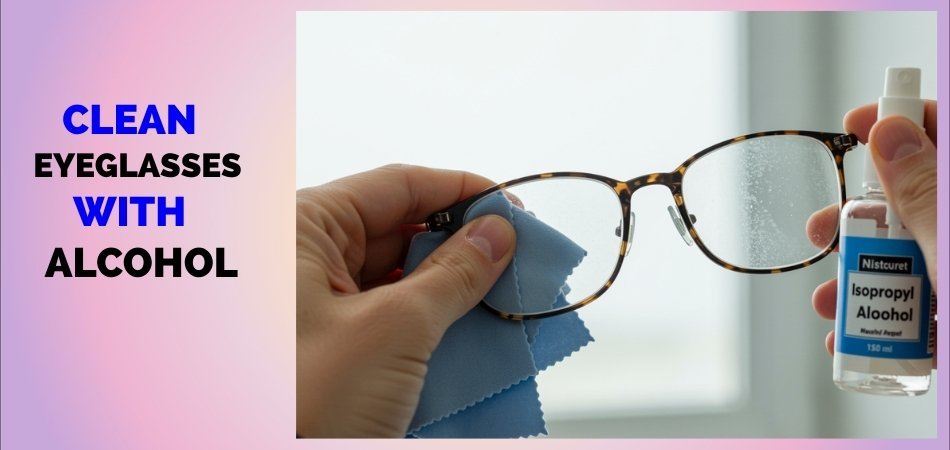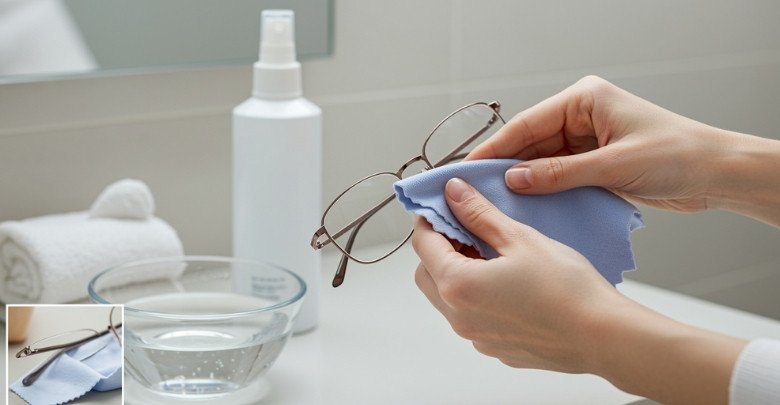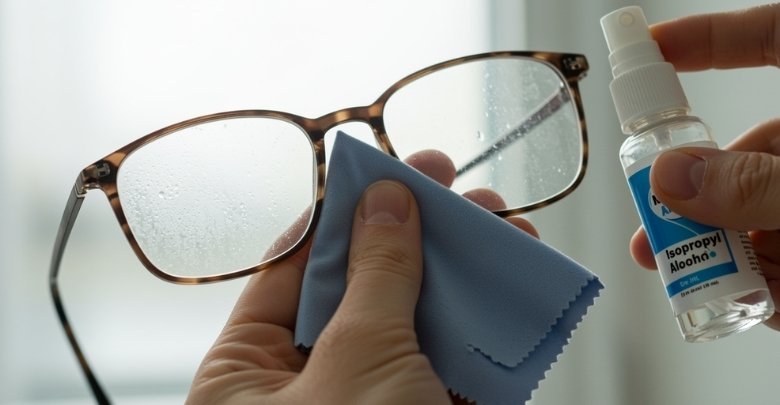Clear vision is essential for daily life, and keeping your eyeglasses clean is an important part of maintaining that clarity. Whether you’re at home or on the go, smudges and dirt can quickly diminish your lenses’ quality. This leads to a common question: Can you clean eyeglasses with alcohol?
No, it’s not recommended to clean eyeglasses with alcohol, especially rubbing or isopropyl alcohol. These chemicals can damage lens coatings, frames, and potentially harm the lens material itself, affecting the clarity and durability of your eyeglasses. Opt for safer cleaning methods instead.
In the following sections of this article, we’ll explore safer, more effective methods to keep your eyeglasses in top shape. So, check out the rest of the article to learn more!
Can You Clean Eyeglasses With Alcohol?
No, it’s not recommended to clean your eyeglasses with alcohol. You might think alcohol works well for cleaning, but it can actually harm your lenses. Here’s why it’s better to avoid alcohol when cleaning.

Damages Lens Coatings
Many eyeglasses come with special coatings to protect the lenses and improve vision. Alcohol can easily damage or strip off these coatings, leaving your glasses more vulnerable to scratches and dirt buildup. Over time, repeated use of alcohol may even make the lenses blurry. It’s always a good idea to protect the coatings to keep your vision clear.
Affects Frame Material
Not just the lenses, but the frame of your glasses can also get damaged by alcohol. Alcohol can weaken or dry out the frame material, especially if it’s made of plastic or certain types of metal. This can cause the frame to crack or become brittle, which might lead to broken glasses. So, it’s best to avoid using alcohol on the frame.
Risks of Streaking
If you’ve ever tried cleaning your glasses with alcohol, you might have noticed that it can leave streaks on the lenses. Streaks make it harder to see clearly and can be frustrating to deal with. These streaks often happen because alcohol evaporates quickly, which means it doesn’t allow enough time for a smooth, even clean.
Can Cause Lens Damage
Alcohol can also affect the material of the lenses themselves. If your lenses are made of certain materials like plastic or polycarbonate, alcohol can cause them to become cloudy or even weaken the lens surface. Over time, this can impact the overall clarity and durability of your glasses.
Dries Out Lenses
When alcohol is used to clean lenses, it can dry out the surface. This can make the lens material more fragile and more prone to cracking. Additionally, this dryness can create a rough surface on the lens, which may cause scratching over time.
Quick Evaporation
Alcohol evaporates very quickly, which may seem like a good thing, but it can leave your glasses with leftover residue or streaks. This quick evaporation prevents the alcohol from properly dissolving dirt and smudges, leaving your lenses not as clean as you’d like them to be.
Using alcohol to clean your eyeglasses can cause damage to lens coatings, weaken frames, and leave streaks behind. Instead of alcohol, it’s safer to use special lens wipes for glasses safety or advanced eye-cleaning tools that keep your lenses clear and safe without any harm.
What’s the Best Way to Clean Eyeglasses?
Clear vision and lens care depend on keeping your eyeglasses clean. Many people are concerned about the right way to do it without damaging their glasses. There are actually some simple and safe ways you can try. Here are some ideas for cleaning your eyeglasses easily:

Use Mild Soap and Water
One of the best ways to clean your glasses is by using mild soap and lukewarm water. Gently rub the lenses and frames with your fingers to remove dirt and oils. Make sure the soap doesn’t have lotions or strong chemicals in it. Rinse well and dry with a soft, clean cloth.
Choose a Microfiber Cloth
Always use a microfiber cloth to dry and clean your lenses. These clothes are super soft and made to avoid scratching your glasses. Avoid using paper towels, tissues, or your shirt because they can leave small scratches. Keep your microfiber cloth clean so it doesn’t spread dirt back onto the lenses.
Use Lens Cleaning Sprays
Lens cleaning sprays made especially for glasses are safe and very helpful. Spray a small amount on each lens and wipe it off with a microfiber cloth. These sprays are made to clean without leaving streaks or damaging your lenses. Don’t use regular household cleaners because they are too harsh.
Avoid Cleaning Glasses Dry
Never try to clean your eyeglasses when they are dry because dust and tiny particles can scratch the lenses. Always rinse them first with water to wash away dirt. Then, clean them with soap or a cleaning spray. This simple step protects your lenses from getting scratched.
Try Advanced Eyeglass Cleaning Tools
Consider using advanced eyeglass cleaning tools to simplify your cleaning process. There are convenient options available, such as peeps by Carbon Klean, that have special carbon technology that safely removes dirt and smudges without scratching the lenses. You can also clean your glasses with ultrasonic cleaning machines. Using these tools will keep your lenses spotless and clear.
Handle Frames Gently
When you clean your glasses, always hold them by the frame, not by the lenses. Holding by the frame keeps pressure off the lenses and helps avoid bending or damaging your glasses. Be gentle while wiping and washing to make sure they stay in good shape. Treating your glasses carefully helps them last longer.
Store Glasses Properly
After cleaning your glasses, always store them in a hard case. This protects them from dust, scratches, and accidents. Leaving glasses out on tables or stuffing them in bags can easily damage them. A proper case keeps your lenses clean and safe for longer use.
How to Spot a Safe Cleaning Product for Eyeglasses?
Choosing the right cleaning product for your eyeglasses is very important to keep them clear and scratch-free. But with so many options out there, it can get confusing. Don’t worry, there are some simple things to look for. Keep reading to learn how to pick the safest products for your glasses:
Check for Lens-Safe Labels
Always look for cleaning products that clearly say they are safe for lenses. This is especially important when you are cleaning anti-reflective eyeglasses, as these coatings can be sensitive. These labels usually mention “safe for coated lenses” or “optical safe.” If the product does not mention glasses or lenses, it might not be safe. Using the wrong cleaner can damage the lens surface or coatings.
Avoid Harsh Chemicals
Stay away from products that contain strong chemicals like ammonia, bleach, or vinegar. These can harm the special coatings on your lenses and even weaken the frames. Cleaning products with gentle ingredients are much safer for your eyeglasses. Always read the ingredient list before using any cleaner.
Choose Alcohol-Free Solutions
Alcohol might sound like a good cleaner, but it can cause more harm than good. It can dry out the lens coating and even lead to cracking or peeling over time. Alcohol-free cleaning solutions are softer and better for both lenses and frames. They help your glasses stay in good condition longer.
Pick Trusted Brands
Well-known brands that make lens care products are usually a safer choice. They test their cleaners to make sure they won’t harm your lenses. Unknown or cheap brands might use low-quality ingredients that can scratch or damage your glasses. A trusted brand gives you more peace of mind.
Test with a Small Area
If you’re trying a new cleaning product, always test it on a small, hidden part of the frame first. This way, you can see if the cleaner causes any damage or discoloration. If everything looks fine, you can use it on the whole pair. Testing first can save your glasses from harm.
Look for User Reviews
Before buying a cleaning product, check what other people are saying about it. Reviews can tell you if the cleaner works well and if others have had any problems. Positive reviews are a good sign that the product is safe and effective. It’s always smart to learn from other people’s experiences.
Is Alcohol the Only Compound to Avoid When Cleaning Eyeglasses?
No, alcohol is not the only compound you should avoid when cleaning eyeglasses. While many think alcohol is the biggest concern, several other chemicals can also harm your lenses and frames. Some may even cause permanent damage if used regularly. Here are the details about other compounds that are not recommended for eyeglass cleaning:

Ammonia
Ammonia is found in many household cleaners but should never be used on eyeglasses. It can strip away special coatings like anti-reflective or scratch-resistant layers. This leaves your lenses more likely to get damaged. Always choose cleaning products that clearly say they are ammonia-free.
Bleach
Bleach is a strong chemical that can ruin both your lenses and frames. Even a small amount can discolor frames and break down lens materials. Using bleach can also create streaks that are almost impossible to remove. It’s best to keep bleach far away from your eyeglasses.
Vinegar
Some people think vinegar is a natural cleaner for everything, but it’s not safe for eyeglasses. Vinegar’s acidity can damage lens coatings and leave behind a smell that’s hard to remove. It can also make metal parts on the frames rust over time. Avoid using vinegar completely.
Window Cleaners
Many window cleaners contain both alcohol and ammonia. These harsh chemicals can seriously harm your lenses and special coatings. Even if a window cleaner claims to be gentle, it’s not made for eyeglasses. Stick to cleaners that are specially designed for lenses.
Acetone
Acetone is found in nail polish remover and some other cleaning products. It can melt certain plastics and damage lens coatings instantly. Even a quick wipe with acetone can ruin your glasses. Always check labels and avoid anything containing acetone.
Strong Detergents
Regular dish soaps or laundry detergents may seem safe, but many contain strong chemicals and fragrances. These can leave residue on your lenses or cause irritation to your skin when wearing the glasses. Only use mild, lotion-free soaps if soap is needed.
Abrasive Cleaners
Any cleaner that feels gritty or contains scrubbing particles should never be used on eyeglasses. These can scratch the lenses and wear down the coatings. Even tiny scratches can make it hard to see clearly. Always choose non-abrasive, gentle cleaning options.
Top Tips to Deal With Scratches Caused by Wrong Cleaning
Scratches on eyeglasses can happen easily if the wrong cleaning methods are used. Whether it’s from harsh chemicals or improper cleaning, it’s important to take care of your lenses. Here are some tips to help manage and reduce the impact of scratches on your glasses.
- Use a Lens Repair Kit: Lens repair kits contain special solutions that fill minor scratches, improving clarity without damaging the lenses further at all.
- Try Baking Soda Paste: Mix baking soda with water into a thick paste, rub gently, and wipe clean to reduce light surface scratches safely.
- Use a Microfiber Cloth: Always wipe lenses with a clean microfiber cloth to avoid adding new scratches or making old ones even worse.
- Seek Professional Help: Opticians can polish deep scratches properly or suggest lens replacement if the damage affects your vision and comfort badly.
- Consider Lens Replacement: When scratches are too deep to repair, replacing the lenses is often the safest and most effective long-term solution.
- Protect With Proper Storage: Always store your eyeglasses in a hard case when not using them to avoid scratches, dust, and accidental damage.
Frequently Asked Questions
Many people still have doubts about how to properly care for their eyeglasses, especially when it comes to cleaning methods. Below, we answer some of the most common questions people have that were not yet covered in the article. Read on to clear up any confusion!
Why Do My Eyeglasses Get Scratched So Easily?
Eyeglasses can get scratched if they are cleaned with rough materials, like paper towels or abrasive cloths. Even dust and grit left on the lens can cause scratches when wiped. Always use a microfiber cloth and avoid cleaning your glasses dry.
Can I Clean My Eyeglasses in the Dishwasher?
No, it is not safe to clean your eyeglasses in the dishwasher. The heat and strong detergent in a dishwasher can damage lens coatings, and the pressure from the water could warp or break the frame. Stick to cleaning your glasses by hand using gentle methods.
Is It Safe to Clean My Eyeglasses With a Lens Cleaning Wipe?
Yes, lens cleaning wipes that are specifically designed for eyewear are a safe option. They are pre-moistened with alcohol-free cleaning solutions and are gentle on lens coatings. Just be sure to choose wipes that are labeled as safe for optical lenses.
Should I Clean My Glasses Immediately After Wearing Them?
It’s a good idea to clean your glasses regularly, but it’s not always necessary to clean them right after wearing them. If your glasses are only slightly smudged, you can use a microfiber cloth to wipe off the dust and oils. If they’re heavily soiled, clean them with soap and water.
How Can I Prevent My Eyeglasses From Getting Dirty So Quickly?
To prevent your glasses from getting dirty, try storing them in a case when not in use. You can also avoid touching the lenses with your fingers, as oils and dirt from your skin can leave smudges. Regularly clean the frames and lenses to avoid buildup.
Can I Clean My Glasses With a Cotton Cloth?
Cotton cloths can be used, but they aren’t the best option for cleaning eyeglasses. They may leave behind lint and can cause scratches if they have any rough edges. Microfiber cloths are the safer choice because they are designed to clean lenses without causing damage.
What Should I Do if My Lens Coating is Peeling?
If your lens coating is peeling, it’s best to visit an optician for advice. They can assess whether the lens can be repaired or if it needs to be replaced. Avoid trying to fix it yourself, as this could make the problem worse.
Bottom Line
Keeping your eyeglasses clean helps you see clearly and keeps your lenses looking new. It’s easy to grab whatever cleaner is nearby, but the wrong choice can do more harm than good. Many people often ask, Can you clean eyeglasses with alcohol — The short answer is no, and for good reason.
Alcohol and other harsh chemicals can damage lens coatings, weaken frames, and even leave streaks that ruin your view. Instead, gentle methods like mild soap, water, and special lens wipes keep your glasses spotless without causing harm. Tools like Peeps by Carbon Klean also offer safe and easy cleaning options.
By choosing the right cleaning products and methods, you can protect your glasses and enjoy clear, comfortable vision every day.






